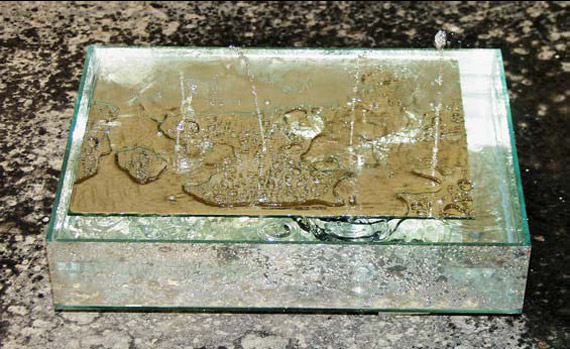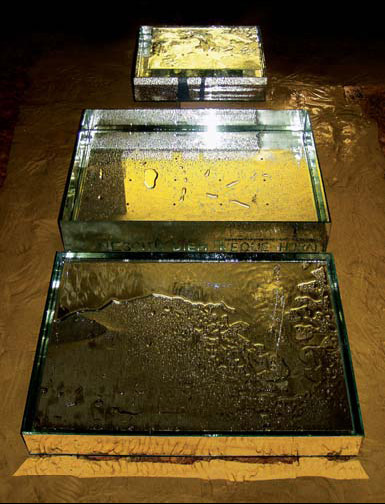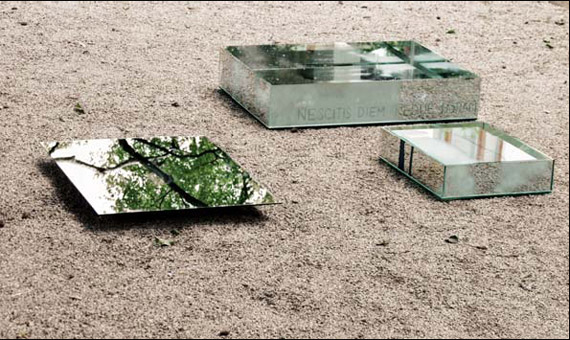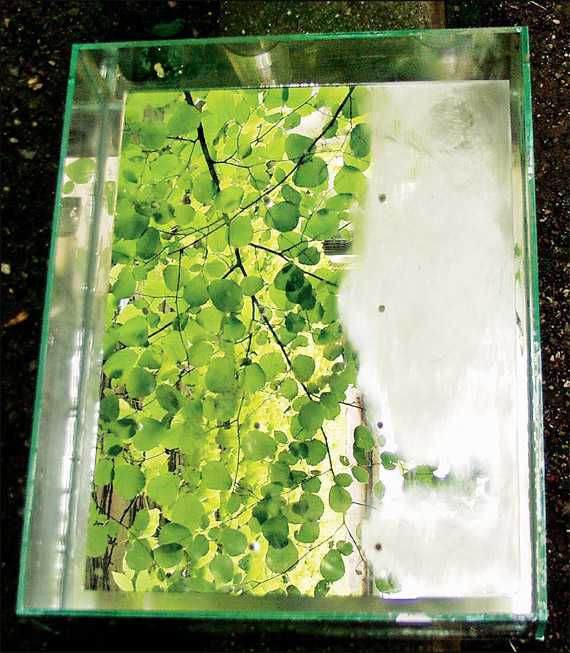|
kiparska postavitev na prostem
na vrtu Komenskega 8, Ljubljana
iz cikla Štirje letni časi na Vrtu / Poletje 2007
16. junija do konca julija 2007
“Summer - tik tak”
ambient installation of art in the open
in the garden Komenskega 8, Ljubljana
from Cycle Four seasons in the Garden / Summer 2007
16 June to the end of July 2007
POLETJE - TIK TAK
Pri projektu Društva likovnih umetnikov Ljubljana Štirje letni
časi na Vrtu je Paola Korošec sodelovala že leta 1999 v času
pomladi. Na vrt je postavila kovinske konstrukcije, ki so na
vrhovih imele pritrjene posodice z zasajenimi dišavnicami materine
dušice (Thymus vulgaris). Če pri pomladni kiparski instalaciji
domnevamo, da so vrt in zelišča povezani, bi za razstavljene
dišavnice lahko dejali, da so imaginarna preslikava samega vrta
v točke osišč. Z izpostavljenostjo pogledu, sorodno organsko
obliko in biološko sorodnostjo so bile reminiscenca vrta v katerega
so bile postavljene, pri čemer je ravno kovinska konstrukcija
kot piedestal določala razmerje objekt, opazovalec in prostor
vrta, kot avtonomnega dela razstave. H kiparski instalaciji poletja
se umetnica v vrt na Komenskega 8 vrača z novejšim opusom, kjer
kot osnovni material uporablja ogledala. Koncept postavitve,
ki se navezuje na tematiko poletja, je v osnovi povezan s časom,
natančneje s sončnimi urami. Od tod tudi napis Nescitis diem,
neque horam! (Ne veš ne ure ne dneva), ki je na največji element
kiparske instalacije prepisan s sončne ure ljubljanske stolnice.
Sončno uro, ki vključuje sonce kot symbol najtoplejšega letnega
časa je Paola Korošec, da bi ohranila horizontalno površino vrta
subverzivno zamenjala z drugim ‘’mehanizmom’’ merjenja časa:
ustvarila je svojevrstno klepsidro (vodno uro). Poletje je tako
predstavljeno z dragocenimi trenutki prostega časa za oddih,
ki ga ponavadi varčujemo celo leto, sonce kot spremljevalec poletja
pa zamenja potreba po vodi. Kiparski elementi v obliki kvadrastih
škatel so sestavljeni iz zlepljenih ogledal z razpraskano zrcalno
površino. Minljivost prostega časa se manifestira v koščkih ogledalne
podobe, ki ni materialna, ampak je le breztelesen in minljiv
pojav. Na vrhnji površini kiparskih elementov v različnih curkih
iz lukenj teče voda. Ta je kot medij hkrati zrcalna kot tudi
prosojna površina. Pri delu Paole Korošec voda podvaja zrcaljenje
ogledala in prosojnost stekla. Pretakanje vode preko razpraskanih
ogledal dinamizira izkušnjo nesrečnega Narcisa ob lastnem odsevu
v vodi. Nelagoden občutek ob želji po ljubezni, ki se spremeni
v grozo, ko prepozna lastno zrcaljeno podobo in se je ne more
dotikati, ne da bi jo razbil na tisoče odbojev, zaljubljenega
Narcisa pahne v smrt. V delu Paole Korošec se ta izkušnja kaže
kot nejasno srečevanje in preseganje virtualne zrcaljene podobe
pred ogledalom, kot suspenz pogleda preko ogledala in kot srečevanja
pogleda s konkretnim prostorom izza za ogledala skozi razpraskane,
prosojne plasti srebrnega nanosa ogledal. Razbitost enovite virtualne
podobe in pogled mimo zrcaljene površine ustvarja zabrisan in
zmehčan mejni prostor med odbijajočim in presevajočim. Gledalec
preko preostalih zrcalnih površin sprejema informacijo o odsotnosti
v realnem prostoru, saj se vidi v njih skupaj z zanj virtualnim
in zato neresničnim prostorom, po drugi strani pa se zaveda realnega
vrta, v katerem je. V delu Paole Korošec prepoznamo razmišljanje
o realnem prostoru in gledalčevem odnosa do njega. Vrt in obiskovalec
nista dovolj. Kiparska instalacija je trenutek zavedanja vrta.
Odnos gledalec-objekt se spremeni v odnos gledalec-prostor. Delo
omogoča trenutek gledalčeve introspekcije in dejanskega doživljanja
poletja v vrtu.
Zoran Srdić
SUMMER - TIK TAK
Paola Korošec contributed to the Ljubljana Fine Artstists Society‘s
Four Seasons in the Garden project in the spring of 1999. She
erected metal constructions in the garden and attached to their
tops containers in which an aromatic herb, thyme (Thymus vulgaris),
was planted. If we assume that in the spring sculptural installation,
the garden and the herbs are connected, we could say that the
aromatic plants on exhibit are an imaginary map from the garden
itself onto axis points. Being exposed to the gaze with their
related organic form and biological affinity, they were a reminder
of the garden in which they were placed, while it was precisely
the metal construction that, as a pedestal, determined the relation
between the object, observer, and garden space as the autonomous
part of the exhibition. The artist has returned to the summer
sculptural installation in the garden at Komenskega 8 with more
recent work in which mirrors serve as her basic material. The
arrangement of the exhibition, which is related to summer is,
in its essence, connected to time, specifically sundials. Hence,
the inscription Nescitis diem, neque horam! (You know not the
day, nor the hour!), the largest element of the sculptural installation
and is transcribed from the sundial of Ljubljana cathedral. To
retain the horizontal garden surface, Paola Korošec subversivelyf
the warmest season, with another “mechanism” for measuring time:
she created a type of clepsydra (water clock). Summer is thus
represented by the precious moments of leisure that we usually
save up throughout the year, while the sun as summer companion
is replaced by the need for water. The sculptural elements in
the form of rectangular boxes are constructed from glued mirrors
with a scratched reflecting surface. The fleetingness of free
time is manifested in the fragments of the mirror image, which
is not a material, but a bodiless and fleeting phenomenon. From
the holes in the upper layer of the sculptural elements, various
spouts of water emerge. Like the medium, this is both a reflecting
and a translucent surface. In Paola Korošec’s work, water doubles
the reflecting of the mirror and the translucency of the glass.
Water flowing across scratched mirrors recalls the experience
of the unhappy Narcissus upon seeing his own reflection in the
water. The unease he feels in a desire for love that turns into
horror when he recognises his own reflected image and cannot
touch it without breaking it into thousands of reflections drives
the enamoured Narcissus to his death. In Korošec’s work, this
experience is shown as an unclear facing and ranscending of a
virtual reflected image in front of a mirror, as a suspension
of the gaze beyond the mirror, and as the gaze facing a concrete
space behind the mirror through the scratched, translucent layers
of the mirrors’ silver lining. The shattered uniform virtual
image and the gaze beyond the reflected surface create a blurred
and softened borderline between the reflecting and the translucent.
Through other reflecting surfaces, viewers receive information
about absence in real space, seeing themselves in these surfaces,
together with the space that is for them virtual and therefore
unreal, while, on the other hand, they are aware of the real
garden where they are. In the work of Paola Korošec we can recognise
an examination of real space and the viewer’s relation to it.
The garden and the viewer are not enough. The sculptural installation
is the moment of becoming aware of the garden. The viewer-object
relation is transformed into the viewer-space relation. The work
enables the viewer’s introspection and actual experience of summer
in the garden.
Zoran Srdić







“Poletje - tik tak”, 2007, kiparska kompozicija,
mešana tehnika “Summer - tik tak”, 2007, Sculpture composition,
mixed technique

Paola Korošec je rojena 5. novembra 1969 v Ljubljani. Diplomirala
1993 leta na Akademiji za likovno umetnost v Ljubljani na oddelku
za kiparstvo, kjer je vpisala podiplomski študij iz kiparstva in
restavratorstva. Dela na različnih kiparskih in restavratorskih
projektih doma in v tujini. Dela se pogosto dotikajo dialoga med
odprtim prostorom parkov, arhitekturo in kiparstvom. Za dosežke
v kiparstvu prejela študentsko Prešernovo nagrado. Izpopolnjuje
se s študijskimi potovanji v dežele Mediterana, bivanjem v mestih
kot so Paris (Cite des Artes), New York... Živi in dela v Ljubljani.
Paola Korošec was born on 5 November 1969 in Ljubljana. She graduated
in sculpture in 1993 from Ljubljana Academy of Fine Arts, where
she continued post-graduate studies in sculpture and restoration.
She works on various sculpture and restoration projects at ome
and abroad. Her work often touches upon the dialogue between the
open space of arks, architecture and sculpture. She has received
the student Prešeren Award for her achievements in sculpture. She
is expanding her knowledge by educational journeys to he countries
of the Mediterranean, and by staying in cities such as Paris (Cite
des Artes), New York, etc. She lives and works in Ljubljana.
Izbor razstav / Selected exhibitions:
1997 Park dvorca Sixta, Jakovlje (Hrvaška) / Park of Sixta Mansion, Jakovlje
(Croatia)
likovna kolonija, Vipavski križ / Fine arts workshop, Vipavski križ
Pilonova galerija, Ajdovščina / Pilon Gallery, Ajdovščina
1998 likovna kolonija, Sinji vrh / Fine arts workshop, Sinji vrh
1999 Hiša kulture, Pivka / House of Culture, Pivka
DSLU- vrt, Ljubljana / Fine Artists Society - garden, Ljubljana
2000 Försterjev vrt, Ljubljana / Förster’s Garden, Ljubljana
2001 Križajev vrt, Ajdovščina / Križaj’s Garden, Ajdovščina
ob festivalu komornega teatra Zlatni lav, Umag (Hrvaška) / Accompanying the
International Chamber Theatre
Festival Golden Lion, Umag (Croatia)
2002 Mestna galerija, Nova Gorica / City Gallery, Nova Gorica
likovna kolonija, Chemnitz (Nemčija) / Fine arts workshop, Chemnitz (Germany)
Border life, Breitenfurth in Graz (Avstrija) / Border Life, Breitenfurth and
Graz (Austria)
2003 Centar savremenih umjetnosti, Podgorica (Srbija in Črna Gora) / Contemporary
Art Centre of Montenegro,
Podgorica (Montenegro)
2004 spremljevalci premodernih, galerija Premoderne umetnosti, Hotič / Companions
of the Too Modern, gallery of the
Museum of Too Modern Art, Hotič
2005 Materika, pogledi na sodobno kiparstvo Avstrije, Hrvaške, Italije in Slovenije,
grad Gorica, Gorica (Italija) /
Materika, Views on the contemporary sculpture of Austria, Croatia, Italy and
Slovenia, Gorizia Castle, Gorizia (Italy)
2006 ALU, Ljubljana / Academy of Fine Arts, Ljubljana
Skupinski projekti / Group projects:
2004 Dance macabre / Dance Macabre
2006 Cost Action 17: Fire Loss to Built Heritage, Ljubljana / Cost Action 17:
Fire Loss to Built Heritage, Ljubljana
Celoletni zvoki Planinskega polja, Postojna / The Year-round Sounds of Planinsko
Field, Postojna
Sledi obraza / Facial Traces
Zvočno telo / Sound Body
naslov / adress: Resljeva 3, 1000 Ljubljana, Slovenija
telefon / telephone: +386 1 43 17 113
gsm: +386 31 430 769
e-mail: paola.korosec@guest.arnes.si

Organizacija razstave in izdajatelj / Organization of the exhibition
and publisher:
Društvo likovnih umetnikov Ljubljana / Ljubljana Fine Artists Society,
za izdajatelja / For the publisher: Jožef Vrščaj, Dušan Muc
Besedilo / Text: Zoran Srdić, Prevod v angleščino / English translation: U.T.A.
Prevajanje;
oblikovanje vabila in zloženke / Design: Dušan Muc; priprava in tisk / DTP and
printed by: Mat-Format d.o.o.;
naklada / Print run: 300 izvodov / Copies; Ljubljana, Slovenija, 2007
Razstavo je podprl Oddelek za kulturo in raziskovalno dejavnost Mestne občine
Ljubljana / The exhibition has been supported by the City of Ljubljana
Komenskega 8, 1000 Ljubljana, tel.: +386 1 434 9465
e-naslov: info@dlul-drustvo.si, www.dlul-drustvo.si
|